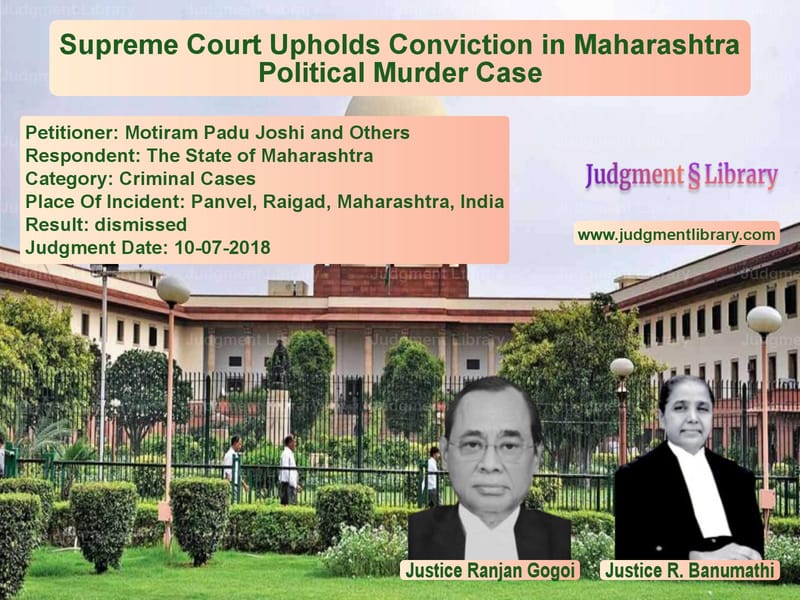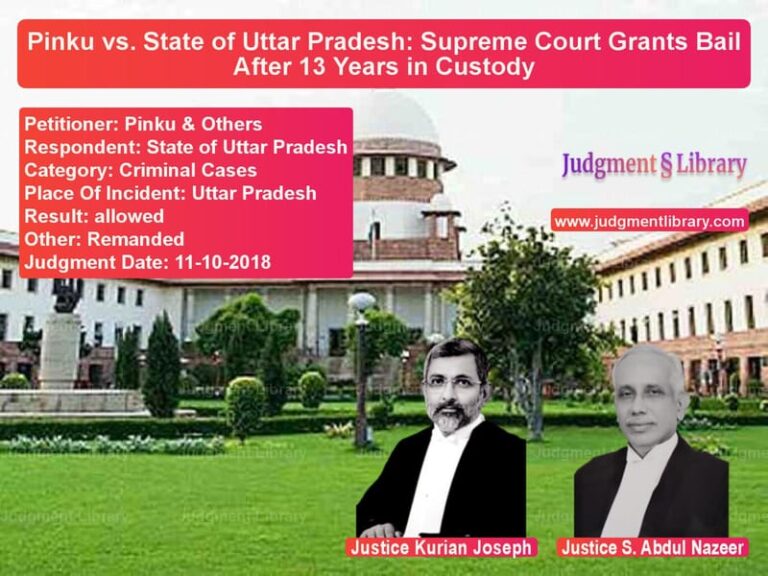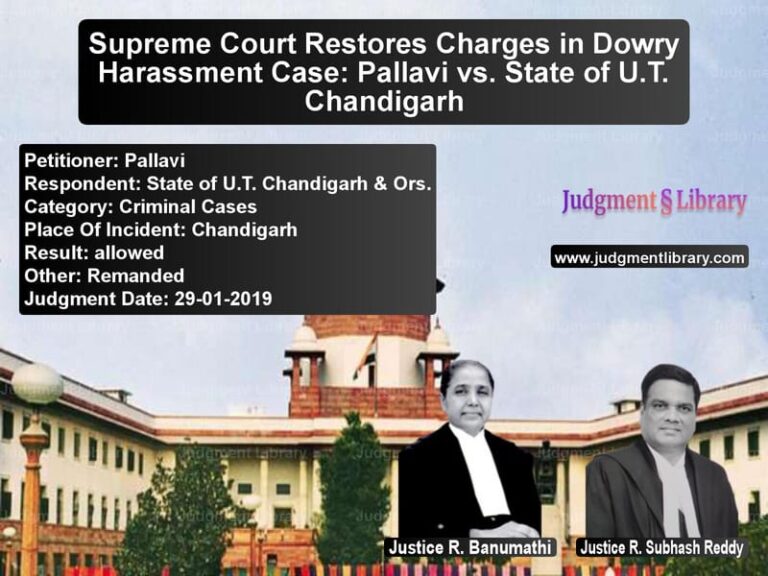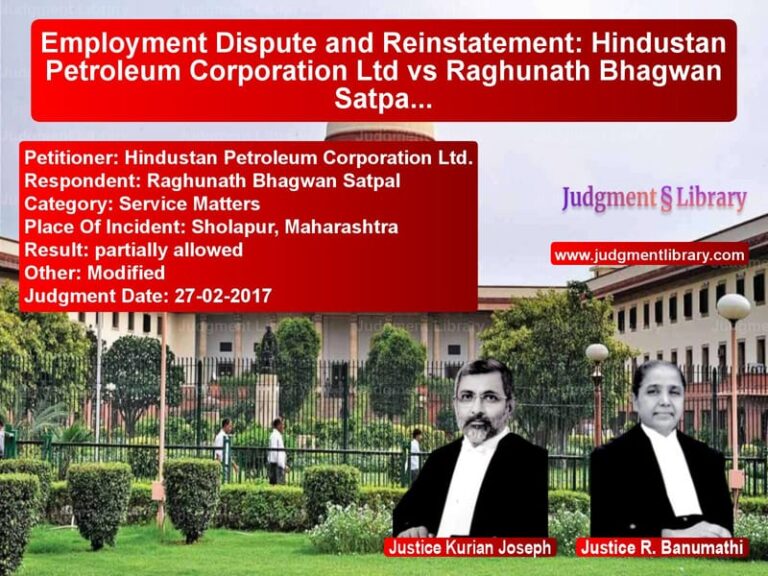Supreme Court Upholds Conviction in Maharashtra Political Murder Case
The Supreme Court of India, in the case of Motiram Padu Joshi and Others vs. The State of Maharashtra, upheld the conviction of the accused in a politically motivated murder case in Panvel, Maharashtra. The case revolved around the brutal killing of Machindra Budhaji Joshi amid ongoing political enmity between rival factions.
Background of the Case
The case dates back to April 26, 1992, when the deceased, Machindra Budhaji Joshi, was attacked by a group of accused individuals wielding swords, knives, and chains. The assailants, led by Motiram Padu Joshi and his accomplices, belonged to the Congress party, while the deceased and witnesses were associated with the Shiv Sena. The political rivalry between the two factions escalated following the Zilla Parishad elections in 1992.
Incident Details
According to the prosecution, on the night of the incident:
- Machindra Budhaji Joshi was at home, sitting outside with friends.
- The accused arrived armed with deadly weapons.
- Motiram (A3) attacked the deceased with a sword on the head.
- Ratan (A5) inflicted sword injuries on his legs.
- Ramnath (A8) attacked the deceased on his head with a sword.
- Devidas (A7) used a knife to inflict injuries on the deceased’s legs and feet.
- The other accused assaulted him with chains and sticks.
Medical Evidence
PW-14, Dr. Ramrao Kendre, who conducted the autopsy, recorded:
- 26 injuries on the deceased, including deep incised wounds on the head, legs, and arms.
- Cause of death was “shock secondary to cerebral contusion due to blunt trauma over the occipital area.”
Legal Proceedings
Following the incident, the police registered an FIR and arrested the accused. The trial court initially acquitted the accused, doubting the credibility of eyewitnesses. However, the Bombay High Court overturned the acquittal and convicted the accused under Sections 147, 148, 302 read with 149 IPC, sentencing them to life imprisonment.
Petitioner’s Arguments
The defense contended that:
- The eyewitness testimony was unreliable due to inconsistencies.
- The accused were falsely implicated due to political rivalry.
- The trial court had correctly acquitted the accused based on lack of conclusive evidence.
Respondent’s Arguments
The prosecution argued that:
- There was a clear political motive behind the murder.
- The medical evidence corroborated the prosecution’s case.
- The recovery of weapons from the accused further strengthened the case.
Supreme Court’s Observations
The Supreme Court made the following observations:
- “The trial court failed to appreciate material evidence, leading to an erroneous acquittal.”
- “The eyewitness testimonies, though related to the deceased, were consistent and supported by medical evidence.”
- “Political enmity was the driving factor behind the crime, and the accused had a clear motive.”
Final Judgment
The Supreme Court upheld the conviction and dismissed the appeal, affirming:
- The life imprisonment sentence awarded by the High Court.
- The credibility of eyewitnesses, despite their relation to the deceased.
- The application of Section 302 IPC, given the brutal nature of the crime.
Impact of the Judgment
- Reinforcement of Judicial Precedents: The ruling reaffirmed that appellate courts have the power to overturn trial court acquittals when there are significant errors.
- Political Crimes and Legal Consequences: The case set a precedent for handling politically motivated crimes with strict legal scrutiny.
- Judicial Approach to Eyewitnesses: The ruling emphasized that related witnesses should not be discredited merely due to familial ties with the victim.
Legal Precedents Considered
The Court referred to:
- Mohabbat vs. State of Madhya Pradesh (2009) – On reliability of related witnesses.
- State of Punjab vs. Jagir Singh (1974) – On assessing the credibility of eyewitnesses.
- Rana Partap vs. State of Haryana (1983) – Addressing witness reactions in crime situations.
Conclusion
The Supreme Court’s decision in Motiram Padu Joshi and Others vs. The State of Maharashtra serves as a crucial ruling in politically motivated criminal cases. The judgment reinforces the importance of fair legal evaluation, ensuring that justice is not derailed by procedural errors or extraneous considerations. By upholding the conviction, the Court has strengthened legal precedents on political violence and fair trial principles in criminal law.
Petitioner Name: Motiram Padu Joshi and Others.Respondent Name: The State of Maharashtra.Judgment By: Justice Ranjan Gogoi, Justice R. Banumathi.Place Of Incident: Panvel, Raigad, Maharashtra, India.Judgment Date: 10-07-2018.
Don’t miss out on the full details! Download the complete judgment in PDF format below and gain valuable insights instantly!
Download Judgment: Motiram Padu Joshi a vs The State of Maharas Supreme Court of India Judgment Dated 10-07-2018.pdf
Direct Downlaod Judgment: Direct downlaod this Judgment
See all petitions in Murder Cases
See all petitions in Attempt to Murder Cases
See all petitions in Judgment by Ranjan Gogoi
See all petitions in Judgment by R. Banumathi
See all petitions in dismissed
See all petitions in supreme court of India judgments July 2018
See all petitions in 2018 judgments
See all posts in Criminal Cases Category
See all allowed petitions in Criminal Cases Category
See all Dismissed petitions in Criminal Cases Category
See all partially allowed petitions in Criminal Cases Category







